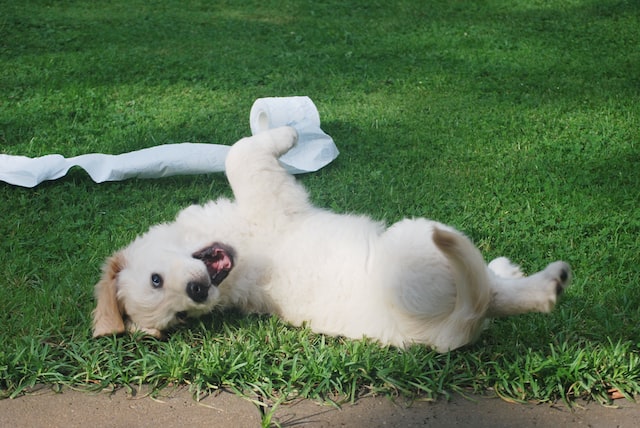There are many potential causes of diarrhoea in dogs, including dietary indiscretion (eating something they shouldn’t), dietary allergy or intolerance, infections, inflammation, parasites, and certain medications. In some cases, the cause of diarrhea may be difficult to determine, and your veterinarian may need to perform tests to diagnose the underlying problem. It’s important to monitor your dog for any signs of diarrhoea and to consult with a veterinarian if the diarrhoea persists or if your dog is showing other signs of illness, such as vomiting, loss of appetite, or lethargy. Prompt treatment can help to prevent dehydration and other complications, and it can also help to identify and address the underlying cause of the why is my dogs poo blue.

Is dog diarrhoea serious ?
Diarrhoea in dogs can range from mild and self-limiting to severe and potentially life-threatening. Mild diarrhoea may resolve on its own within a few days, and it may not require any treatment other than dietary changes or supportive care. However, more severe cases of diarrhoea can lead to dehydration and other complications, and they may require prompt medical attention. Additionally, chronic or recurrent diarrhoea can be a sign of an underlying health problem, such as an infection or inflammatory bowel disease, and it may require further diagnostic testing and treatment. It’s important to monitor your dog for any signs of diarrhoea and to consult with a vet if the diarrhoea persists or if your dog is showing other signs of illness. Prompt treatment can help to prevent complications and ensure the best possible outcome for your dog.
What dogs poo can tell us
Poop, or fecees, can be a good indicator of a dog’s overall health. Healthy poop should be well-formed and have a brown colour, and it should not contain any undigested food or foreign objects. The frequency of your dog’s bowel movements may vary depending on their diet and lifestyle, but they should generally have at least one bowel movement per day. If your dog’s poop is not well-formed, has a different colour, or contains other substances, this can be a sign of an underlying health problem. For example, diarrhoea or soft stool can be a sign of an infection or dietary indiscretion, while black or tarry stool can be a sign of bleeding in the gastrointestinal tract. If you are concerned about your dog’s poop, it’s important to consult with a veterinarian to determine the underlying cause and appropriate treatment.
Green diarrhoea
Green diarrhea in dogs can be caused by a number of factors, including the presence of bile in the stool, the ingestion of green plants or other green-colored substances, or the presence of certain bacteria or parasites. Bile is a digestive juice that is produced by the liver and stored in the gallbladder. It helps to digest fats and gives feces its normal brown color. However, if the bile is not being properly absorbed by the intestines, it can pass into the feces and give it a greenish color. This can be a sign of a problem with the liver, gallbladder, or intestines, and it may require further diagnostic testing and treatment. Additionally, the ingestion of green plants or other green-colored substances can also cause green diarrhoea, as can certain infections or parasites. If your dog has green diarrhoea, it’s important to consult with a veterinarian to determine the underlying cause and appropriate treatment.
Blue dog poo
Blue poo in dogs is usually the result of the ingestion of a blue-coloured substance, such as a dye or food colouring. In most cases, blue poo is not a cause for concern and it will resolve on its own within a few days. However, if your dog is experiencing other symptoms, such as vomiting or loss of appetite, or if the blue poop persists for more than a few days, it’s important to consult with a vet. They will be able to determine the cause of the blue poop and recommend any necessary treatment. In rare cases, blue poop can be a sign of a more serious underlying health problem, such as liver or pancreas disease, and it may require further diagnostic testing and treatment. It’s always best to consult with a veterinarian if you are concerned about your dog’s health. Sometimes rat poison has blue dye in it, and would be cause of serious concern.
Black dog poo
Black poop in dogs can be caused by a number of factors, including the presence of blood in the stool, the ingestion of black-colored substances, or certain medical conditions. Black poop that is caused by the presence of blood is known as melena, and it can be a sign of an underlying health problem, such as an ulcer, cancer, or an infection. Black poop that is caused by the ingestion of black-coloured substances, such as charcoal or liquorice, is not typically a cause for concern and it will resolve on its own within a few days. However, if your dog is experiencing other symptoms, such as vomiting or loss of appetite, or if the black poop persists for more than a few days, it’s important to consult with a veterinarian. They will be able to determine the cause of the black poop and recommend any necessary treatment.
